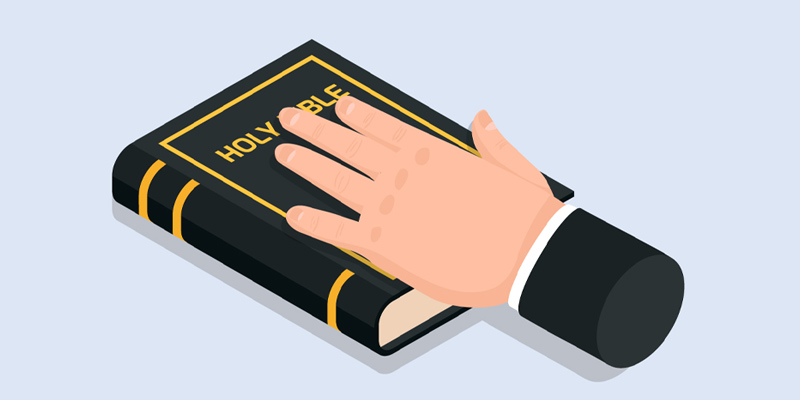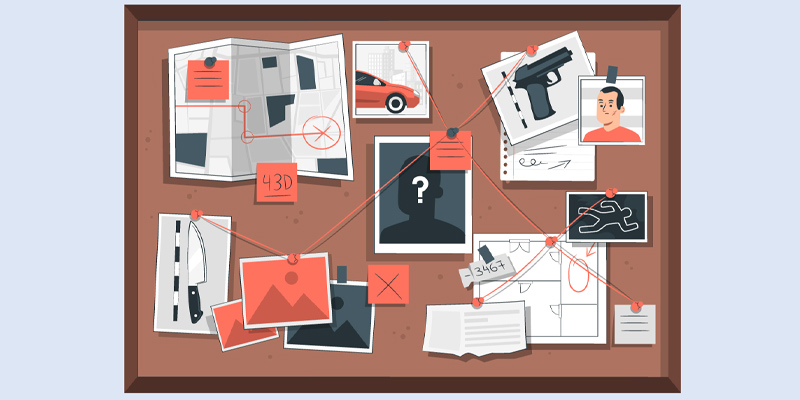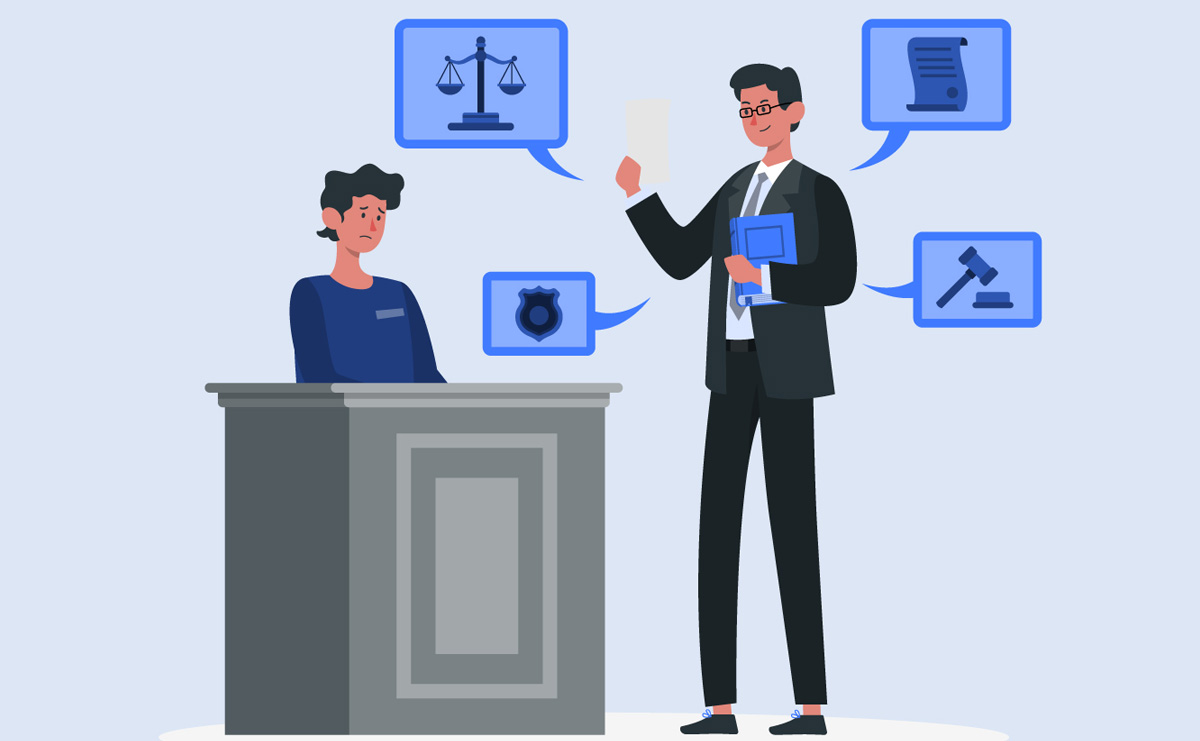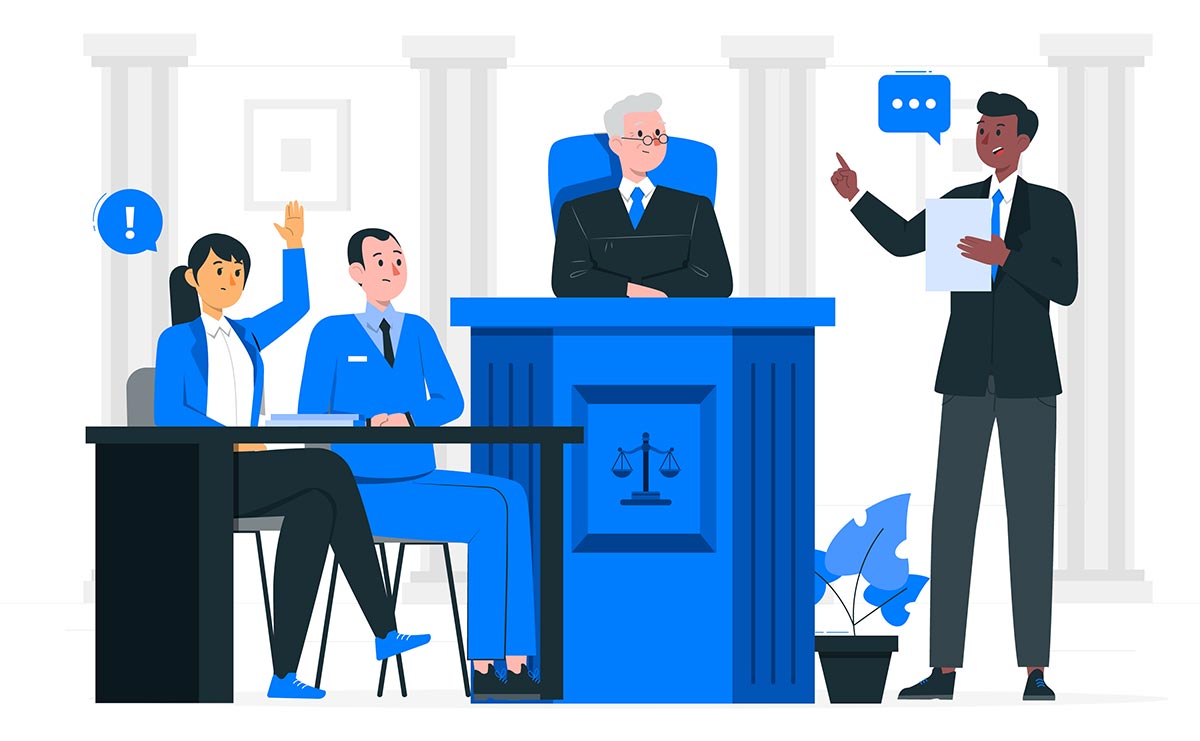Contents
What is an Objection in Court?
The objections in court are a formal protest made by an attorney during a trial to challenge the admissibility of evidence or the way a question is being asked. It is a way for the attorney to alert the judge that they believe a legal rule is being violated, either by the opposing attorney’s line of questioning or the introduction of evidence. Understanding how to effectively raise courtroom objections is a critical skill for any trial attorney, ensuring that improper evidence is kept out. When an attorney objects, the judge must decide whether to sustain or overrule it.
Objections are crucial not only for maintaining fairness but also for preserving the integrity of the legal process. By raising objections, attorneys can ensure that both parties adhere to the legal standards outlined in the courtroom, protecting their client’s right to a fair trial. Objections also safeguard against improper questions, witness testimony, or evidence that may violate constitutional rights, such as due process or self-incrimination.
Furthermore, objections empower lawyers to create a clear record for potential appeals. If the trial court overrules an objection, it provides a basis for appellate courts to review whether a legal error occurred that could have affected the trial outcome. Strategically, objections can be used to disrupt the opposing counsel’s momentum, control the flow of information, and guide the jury’s focus toward admissible evidence that is beneficial to their case. In essence, objections are a powerful tool in trial advocacy, balancing the scales of justice by enforcing legal standards and protecting against unfair prejudice.
Common Types of Objections in Court
In the courtroom, objections play a key role in helping attorneys manage the flow of evidence and testimony. They are essential for making sure only appropriate information is presented and for stopping any improper testimony or actions that might sway the judge or jury. Here are some of the most common objections in court that attorneys use during litigation:
Hearsay
Hearsay is a legal concept that refers to an out-of-court statement offered as evidence to prove the truth of the matter asserted. The key concern with hearsay is that the person who made the original statement is not available for cross-examination, which undermines the fairness and reliability of the evidence. In most cases, hearsay is inadmissible in court because it lacks the safeguards of firsthand testimony, such as the ability of opposing counsel to challenge the statement’s accuracy or credibility.
There are several exceptions to the hearsay rule where such statements may be allowed. For example, statements made under certain conditions, such as excited utterances or statements against interest, may be considered reliable enough to be admitted. Additionally, business records, public records, and prior testimony under oath are examples of other exceptions where hearsay may be permitted.
- Example: A witness saying, “John told me he saw the defendant at the crime scene.” The witness is not testifying to their own observation but is relaying John’s out-of-court statement, and John is not present to be questioned about what he saw.
Relevance Objection
In legal proceedings, relevance is paramount. It ensures that the case’s core issues remain the focus. Evidence or testimony must be directly related to the facts and matters in dispute. Any irrelevant information—speculative, tangential, or unrelated to the case—can distract the court, lead to confusion, or prejudice the outcome. Courts typically reject such information as it does not contribute to establishing the facts or advancing the legal arguments at hand. By adhering to the principle of relevance, the judicial process remains efficient, fair, and focused on the pertinent legal and factual issues necessary for a just resolution.
- Example: Bringing up a defendant’s past unrelated criminal behavior to prove guilt in a current case.
Leading the Witness
Leading the witness is a technique used when a lawyer asks a question in a way that suggests the answer they want the witness to give. This is mainly restricted during direct examination, where the purpose is to allow the witness to tell their own version of events. Questions in direct examination should be open-ended to prevent the lawyer from influencing the testimony. However, leading questions are typically allowed during cross-examination. In cross-examination, the goal is often to challenge the witness’s credibility or clarify specific points, and leading questions can help lawyers control the flow of testimony and narrow in on particular facts. This distinction ensures that witnesses provide untainted, honest testimony during direct examination while allowing the opposing counsel more flexibility in questioning during cross-examination. There are some exceptions, though, such as when dealing with hostile witnesses or addressing preliminary matters, where leading questions may be permissible even in direct examination. These exceptions provide flexibility in the use of leading questions, allowing lawyers to adapt their questioning to the case’s specific circumstances.
- Example: Asking a witness, “Isn’t it true that you saw the defendant with the gun?”

Speculation Objection
Speculation occurs when a witness offers a statement or opinion about something they do not have direct knowledge of, essentially guessing rather than providing factual testimony based on their observations or experiences. This strict prohibition of speculation in courts is crucial, as it ensures the integrity and reliability of the evidence. It also underscores the significant role witnesses play in the legal process, as they are expected to testify only about what they saw, heard, or experienced.
In some cases, expert witnesses may offer opinions that could seem speculative, but these are based on specialized knowledge and analysis rather than conjecture. Their conclusions are drawn from expertise and professional experience, which is why expert testimony is subject to different rules. This emphasis on the reliability of expert opinions should reassure the audience about the fairness and accuracy of the legal process. Nonetheless, even experts are not permitted to speculate beyond the scope of their expertise or factual knowledge.
- Example: A witness testifying, “I think he was planning to rob the store.”
Improper Opinion
Non-expert witnesses are generally limited to factual testimony about what they observed or experienced. They are not permitted to offer opinions on matters that require specialized knowledge, training, or expertise. Allowing non-experts to give views on technical, scientific, or professional subjects could mislead the court and lead to unreliable conclusions. For instance, a lay witness cannot testify about the cause of an injury in medical terms or provide an opinion on whether a defendant’s actions met legal standards, as these assessments require specialized understanding beyond the average person’s knowledge.
There are limited exceptions where non-expert witnesses may provide opinions, but these are generally restricted to situations where the opinion is based on common sense or personal experience, such as estimating the speed of a vehicle or describing someone’s emotional state based on visible behavior. This clarification of the boundaries of non-expert testimony should make the audience feel more informed about the legal process. Even in these instances, the testimony must be rooted in direct observation, not conjecture or technical analysis.
On the other hand, expert witnesses are specifically called to provide opinions in their area of expertise, such as medical doctors, engineers, or forensic specialists. Their opinions are based on their professional background and are subject to rigorous standards, such as reliability and relevance. This clear distinction between expert and non-expert testimony helps ensure that only qualified individuals give opinions on matters requiring specialized knowledge, safeguarding the fairness and accuracy of the legal process.
- Example: A layperson giving an opinion about the mental state of a defendant when they are not a psychologist or psychiatrist.
Foundation
A proper foundation is crucial before evidence or testimony can be admitted. The foundation establishes that the evidence is relevant to the case and authentic, meaning it is what it purports to be. Evidence that may be unreliable, irrelevant, or improperly presented could be included in laying this foundation.
To establish a foundation, the party introducing the evidence must demonstrate a clear connection between the evidence and the case. This includes showing that the evidence is directly tied to the facts at issue and that the witness has firsthand knowledge or a sufficient basis to speak about it. For physical evidence, such as documents or objects, the party must authenticate it by proving it has not been altered and is indeed the same item that pertains to the case. This often involves a chain of custody for physical items, where each person who handled the evidence must verify that it was properly maintained and not tampered with.
- Example: Offering a document as evidence without showing how it is related to the case or authenticating its origin.
Argumentative Objection
In court, attorneys are expected to ask questions during witness examinations to elicit relevant facts and testimony. When a lawyer crosses the line from asking questions to arguing with the witness, this can result in an objection for being argumentative. An argumentative question occurs when the attorney is not seeking new information but is instead challenging the witness, making accusations, or attempting to persuade the judge or jury rather than allowing the witness to testify. It is an attempt to argue the attorney’s case through the witness, which is improper during questioning.
- Example: “You knew you were lying when you said that, didn’t you?”
Asked and Answered Objection
The “asked and answered” objection is raised when an attorney poses a question to a witness that has already been sufficiently addressed during the examination. The purpose of this objection is to prevent unnecessary repetition, which can waste the court’s time, harass the witness, or influence the judge or jury by reinforcing particular testimony through repetition.
Once a witness has provided an answer to a question, continually asking the same or similar questions can be perceived as an attempt to pressure the witness into changing their response or providing a different answer. This tactic can be unfair and may create the appearance that the lawyer is trying to influence the court’s perception by repeatedly hammering the same point.
The objection is important in maintaining the flow of the trial and ensuring that witness testimony is not manipulated or distorted through excessive questioning. It also protects witnesses from undue stress and prevents the lawyer from undermining the witness’s credibility simply by asking the same question in different ways to elicit a more favorable response.
- Example: The lawyer asks the witness multiple times, “Did you see the defendant at the scene?” after the witness already answered.

Assumes Facts Not in Evidence
The “assumes facts not in evidence” objection is raised when an attorney asks a question that presupposes certain facts that have not been established or introduced into the record. This objection is essential because it ensures that the questions posed to witnesses are based on evidence that has already been admitted, preventing attorneys from introducing unsupported information through their line of questioning.
- Example: “When did you stop cheating on your taxes?” when no evidence of tax fraud has been presented.
Non-Responsive Answer
A “non-responsive answer” objection is raised when a witness provides a response that does not directly address the question posed by the attorney. Instead of answering the specific question, the witness may veer off-topic, provide irrelevant information, or intentionally avoid answering altogether. This objection is essential to keep the testimony focused and prevent witnesses from dodging crucial questions or introducing unrelated information that could confuse the court or jury.
The ‘non-responsive answer’ objection plays a pivotal role in maintaining the fairness and clarity of the testimony. It ensures that witnesses stick to the facts and provide information pertinent to the case without evading key issues. This objection is a key tool in the legal professional’s arsenal to keep the testimony focused and prevent witnesses from dodging crucial questions or introducing unrelated information that could confuse the court or jury.
- Example: When asked, “Did you see the defendant?” the witness begins discussing something unrelated.
Vague or Ambiguous
An objection based on a question being ‘vague or ambiguous’ is a crucial tool in ensuring that the witness understands the question. It arises when the wording of a question is unclear or open to multiple interpretations, making it difficult for the witness to provide a precise or accurate answer. This type of objection is essential in preventing questions that are poorly worded, overly broad, or lacking specificity, which can lead to confusion and result in testimony that may be misleading, incomplete, or irrelevant.
- Example: Asking, “How long is a piece of string?” without providing specific context.
Mischaracterization of Testimony
The “mischaracterization of testimony” objection is raised when an attorney inaccurately summarizes, distorts, or misrepresents what a witness has previously testified. This can happen intentionally to create a misleading narrative or unintentionally due to misunderstanding or poor phrasing. The objection ensures that the witness’s testimony is not twisted or used to support conclusions it does not imply, preserving the accuracy and fairness of the court proceedings.
- Example: A lawyer saying, “You testified that you saw the defendant attack the victim,” when the witness only said they saw the defendant near the victim.
These objections are raised to ensure that the trial follows proper legal procedures and that both parties receive a fair opportunity to present their case.
How to Prepare for Objections in Court
Preparing for objections in court requires a solid understanding of legal rules, courtroom procedures, and strategic thinking. Here are vital steps to help you effectively prepare for and handle objections:
Know the Rules of Evidence
Familiarizing yourself with common grounds for objections is essential, as rules of evidence, including hearsay, relevance, leading questions, speculation, and improper character evidence, should be part of your legal toolkit. Additionally, it is essential to understand the specific rules for your jurisdiction, as each court may have slight variations in how these rules are applied. Therefore, thoroughly researching your local court’s practices is crucial to ensure you are well-prepared.
Anticipate Likely Objections
Reviewing the opposing counsel’s arguments is important to anticipate what types of evidence or questions they might present that could be objectionable. Also, identifying weaknesses in your own case is crucial, as this allows you to pinpoint areas where objections might arise and prepare responses to justify the admissibility of your evidence.
Prepare Your Responses
Preparing quick responses to common objections is essential; anticipate potential objections and practice your responses. For example, if an objection is raised for hearsay, be ready to explain why the evidence fits under an exception to the hearsay rule. Equally important is knowing when to concede an objection. In some cases, it is more strategic to acknowledge rather than engage in a prolonged argument, particularly if the objection does not significantly impact your case.
Stay Calm and Assertive
Responding confidently to objections is crucial; when one is raised, remain calm and professional. Judges typically prefer clear, concise arguments over emotional or disorganized responses. If an objection is vague, do not hesitate to request clarification or a more specific explanation from opposing counsel to ensure a proper understanding before addressing it.
Practice with Mock Trials
Running through mock trials is an effective way to simulate courtroom scenarios with colleagues or mentors, allowing you to practice responding to objections. In addition, preparing witness examinations by rehearsing direct and cross-examinations with your witnesses helps you avoid asking questions likely to draw objections, ensuring a smoother trial process.
Know the Judge’s Preferences
Some judges may have preferences or patterns when ruling on objections. Knowing these tendencies can help you prepare strategies that align with the judge’s expectations.
Use Pretrial Motions
These motions can help you limit or exclude specific evidence before the trial begins, reducing the number of objections you must deal with in court.
Focus on Your Case Strategy
Ensure that every piece of evidence and each question you ask furthers your case and avoid fishing for unnecessary information that could lead to objections.
Keep a Cheat Sheet
Keep a quick reference sheet of objections and responses in your trial binder so that you can react swiftly during the trial.
Prepare for Post-Objection Scenarios
If an objection is sustained, be prepared to introduce alternative evidence or approach your argument from a different angle.
Final Thoughts
Objections are more than just formalities in the courtroom—they are a key tool for keeping trials fair and focused. Attorneys must be familiar with the different types of objections in court, such as hearsay, relevance, and leading questions, to effectively challenge improper evidence or testimony. They help attorneys ensure that only proper evidence is considered, protect their clients’ rights, and set the stage for possible appeals. Knowing when and how to object can make a big difference in the outcome of a case. By preparing for objections and staying calm under pressure, attorneys can navigate the complexities of the legal process more effectively. Ultimately, objections are about upholding the fairness and integrity of the court, making sure both sides get a fair shot at justice.
RunSensible is an all-in-one business management platform designed to streamline operations for law firms and other service-oriented businesses. It offers tools, including CRM, billing, client intake, and workflow automation, to help firms manage their processes efficiently. By integrating various functions into one platform, RunSensible allows firms to improve productivity, enhance client communication, and drive growth, all while reducing administrative burdens. Whether managing cases, tracking leads, or optimizing financials, RunSensible provides the flexibility and power needed to stay ahead in a competitive industry.
Disclaimer: The content provided on this blog is for informational purposes only and does not constitute legal, financial, or professional advice.







